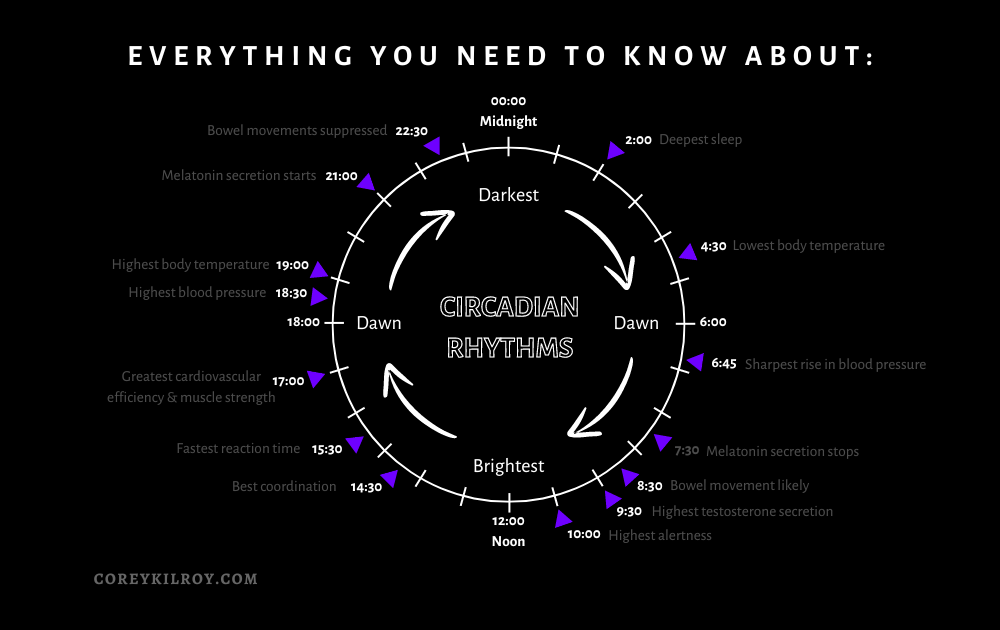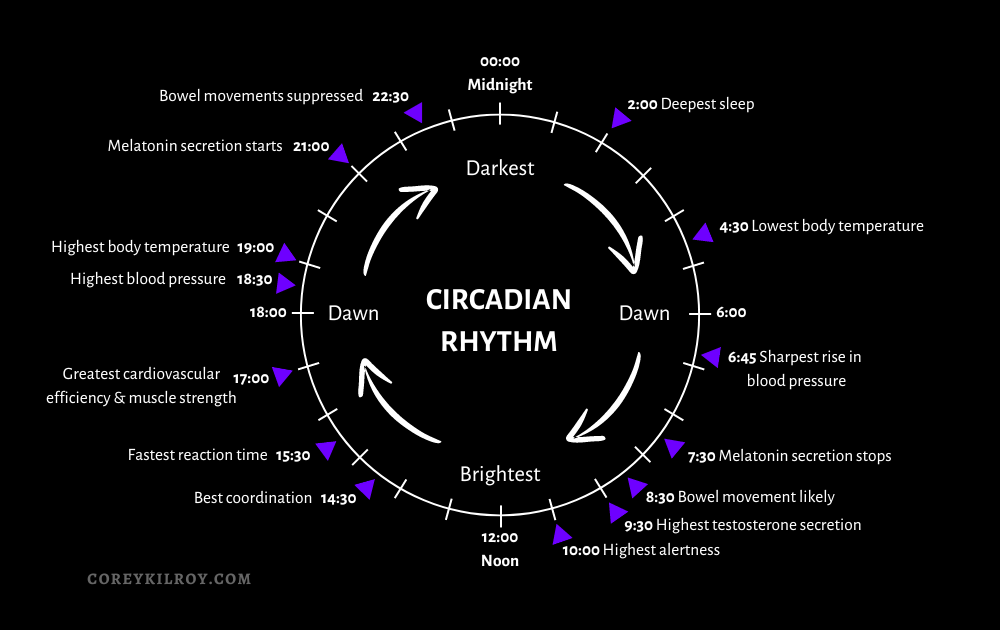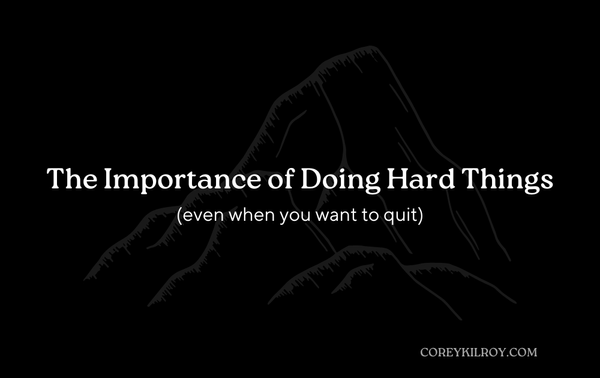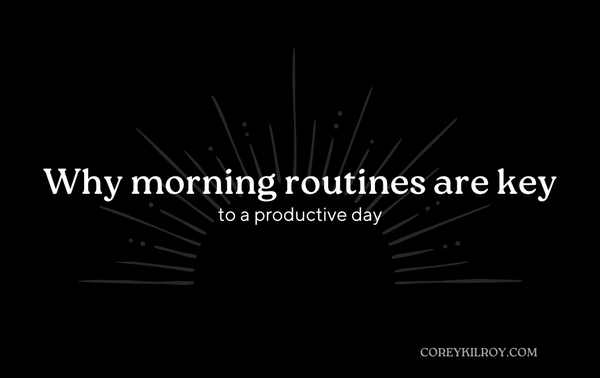Everything you need to know about Circadian Rhythms

Do you ever cancel your alarm clock for the weekend - planning to sleep in for once - when suddenly your eyes pop open around the same time as a normal workday?
That’s your Circadian Rhythm in action.
And it all started with mimosas.
No, not the bottomless ones at brunch…
In 1729, French Physicist Jacques d’Ortous de Mairan (JDM) was studying a Mimosa Pudica plant.
But the Mimosa Pudica wasn’t just any plant. It’s often grown for its unique defense mechanism: the leaves fold inward and go into a fetal position when touched or shaken, defending themselves from harm.
This defense mechanism doesn’t only happen when threatened either.
During the day, the leaves are open and ready to soak in some sunlight. Then when nighttime hits, the plant shuts down for the day and retracts its leaves.
As cool as this is, JDM found something even more interesting.
Now knowing its ability to shrink and contract, he conducted an experiment:
- JDM placed his Mimosa shrub in a box that blocked out the light.
- He let it sit for 24 hours.
- Then he sat and observed.
To his surprise, even though this tiny little Mimosa plant was put in a box and blocked away from the sunlight, it naturally knew when to open its leaves and when to close them.
As if they were on a specific schedule–like clockwork.
This tiny little experiment is now known as one of the first discoveries of the Circadian Rhythm (aka our Internal Clock.)
What are Circadian Rhythms?
Circadian rhythms are “the physical, mental, and behavioral changes an organism experiences over a 24-hour cycle”.
Light and dark tend to have the biggest influence on circadian rhythms, but food intake, stress, physical activity, social environment, and temperature may also affect them.
Most living things have circadian rhythms, including plants, animals, fungi, and, yes, us humans.
Something I thought was pretty cool was that in humans, nearly every tissue and organ has its own circadian rhythm, and collectively they are tuned in harmony to the daily cycle of day and night.
Circadian rhythms tend to influence important functions in the human body, such as:
- Sleep patterns
- Hormone release
- Appetite/digestion
- Temperature
Why Should We Follow Our Circadian Rhythms?
Prehistorically, our bodies haven’t evolved much since then.
We still carry the same biological equipment we had 20,000 years ago. As the years of humanity have gone by, our bodies have gotten used to a certain rhythm of living life.
The problem, however, is that following our natural rhythms is next to impossible in the information age we now live in…
Every day we go to bed later than we should because we look at screens for hours on end until we go to sleep, overeat food & liquid calories that make us heavy and weak, and we avoid physical activity like it’s the plague.
Unfortunately, all of this (and much more) leads to decreased energy, unnecessary weight gain, and eventual disease.
I go over how you can start changing these habits & lose some weight here.
The Science Behind Circadian Rhythms
Let's look at a diagram of our brain, right behind our eyeballs. The key to all of our internal clocks comes from a tiny group of nerves in the hypothalamus of the brain known as the suprachiasmatic nucleus (SCN), which is also known as your “master clock”.
This “master clock” is like a signaling center that responds to environmental cues like light, dark, eating habits, and physical activity.
Additionally, based on the amount of light our eyes receive, the SCN controls the production of a hormone you may be very familiar with (or lack thereof)... melatonin.
In the evening, a person’s master clock will tell their brain to make more melatonin, causing sleepiness.
Remember how I said that even our organs have their own circadian rhythm? Well, the SCN also synchronizes the circadian rhythms in those organs and tissues across the body.

Here’s a basic diagram showing how our basic circadian rhythms work in a 24-hour cycle.
Pretty cool, eh?
When certain cues are experienced throughout the day, your body triggers the release of hormones, regulates temperature, and influences metabolism, sleep, and mood.
- Example #1 of a Circadian Rhythm: As we mentioned above, when the sun starts to set, your body starts preparing for sleep by producing melatonin. That’s why a proper sleep routine and putting the electronics away 2-3 hours before bedtime is crucial because that artificial light can disrupt your rhythm.
- Example #2 of a Circadian Rhythm: I often find myself having to empty my bladder as soon as I wake up in the morning. This is a system that’s been automated in my body due to my circadian rhythm.
So when things are in balance, our bodies will run like clockwork, day in and day out, much like an assembly line.
On the downside, however, when our master clocks are out of balance, this can lead to a domino effect of physical ailments.
- Changes in sleeping patterns
- Changes in eating patterns
- Jet lag
- Light from electronic devices at night
- Going out too late
- Working late
…plus other disturbances to your normal schedule, which can interrupt your Circadian Rhythm.
Ignoring Your Circadian Rhythm Can Lead to a Compromised Health and Body
Your circadian rhythm means a lot more than you think.
Researchers are starting to figure out that dialing in your internal clock can have a number of impacts on your health and body.
A study from 2019 found that after surveying more than 8000 workers from 40 different organizations, researchers found that shift workers were more likely to suffer from infectious diseases, ranging from the common cold to stomach infections, compared to non–shift workers.
These observations show us that when our circadian rhythm is off and we come in contact with everyday viruses, that we are typically resistant to, they can lead to serious illness.
I’ll always preach the importance of making healthy habits a lifestyle because bad habits lead to nothing but trouble.
Bad habits can directly impact our circadian rhythm. Although they may not immediately cause harm in the short term, they do make us vulnerable to factors that can kill us over time or make life increasingly unbearable.
Some things that may happen as a result of having disrupted circadian rhythms are:
- Insomnia
- Changes in mood
- Fat gain
- Increased Hunger
- Accelerated Aging
- Neurologic disorders
- Metabolic disorders
- Hormone Disruption
…and much more.
As demoralizing as all this may seem, your life doesn’t have to be in perfect tune all the time.
Realistically, when you troubleshoot one part of your life to a specific rhythm you may find that everything else inevitably falls into place.
Ultimately, we can train our circadian rhythms to work for us instead of against us.
It’s just a matter of pivoting and adopting healthier lifestyle habits.
How Can You Start Training Your Circadian Rhythm?
1. Fix Your Sleep
Probably the most important factor in synching up our circadian rhythm starts and ends with proper sleep.
One of the best ways to sync your “master clock” is by keeping a regular sleep schedule – going to sleep and waking up at the same time every day.
Try to keep your times within a half hour of each other (yes, even on the weekends) to allow your body to naturally prepare for sleep.
If you’re most likely in the Apple ecosystem, I like to set a “Bedtime” and a specific Alarm so my phone reminds me every day when to get ready for bed and when to wake up.
2. Have a regular eating schedule
Your body loves to stick to a routine when it comes to eating too.
I know it may be difficult for some people depending on their career or lifestyle, however eating at around the same time every day keeps that circadian rhythm in check.
It’s often found that every person has their typical “feeding times” throughout the day.
Once you find your typical eating times, then it becomes much easier to get lean and control your body weight.
Of course, this also means you’re maintaining healthy eating and training habits.
3. Train regularly
Intense physical activity, whether that be cardio or weight training, has been shown to entrain your Circadian Rhythms because of its positive effect on sleep.
It’s also been found that our muscles have their own circadian rhythms as well, and develop a rhythm to when they’re used to being worked out.
Here’s yet another reason why you need to prioritize exercise in your lifestyle.
Aim for at least 3 days of week of training to not only promote a balanced circadian rhythm but also keep your health at its best.
4. Get more sun
If you’re an Andrew Huberman fan, you’re already familiar with his favorite advice on getting proper sun exposure.
One of the best practices is to view sunlight within the first hours of waking (as soon as you can, even if it’s cloudy out), which increases early-day cortisol release (the ideal time for elevated cortisol) and prepares the body for sleep later that evening.
A morning spike in cortisol will also positively influence your immune system, metabolism, and ability to focus during the day.
That’s why training in the morning is an excellent way to start your day.
Sunlight can, and should, be the first trigger of the day that resets the circadian clock daily
It’s the timing cue, also known as a zeitgeber, which entrains the physiologies of humans and thereby helps to prevent critical illness
Here’s Huberman’s morning sunlight protocol:
In the morning, try and get outside for at least 5-10 minutes. You can do more if you have time, and feel free to use the time outside to exercise, walk, or journal in the sunlight.
Even on overcast days, there is still enough sunlight to trigger positive effects, but you’ll need to increase the time outside to at least 15-20 minutes. If it’s dark when you wake up or if the weather prevents you from going outside, flip on as many bright indoor artificial lights as possible — then get outside as soon as the sun is out.
In the end…
Every single one of us has a biological clock that decides what we should be doing throughout the day.
It’s exemplified in living organisms all over the world… so why should we be the species to neglect it?
Here’s a quick synopsis:
- Our Circadian Rhythm is a 24-hour cycle that influences sleep-wake cycles, eating habits, hormone release, body temperature, and many other important bodily functions.
- This “master clock” primarily responds to light, darkness, eating habits, and physical activity.
- Failure to follow this rhythm can eventually lead to serious health issues down the line.
- You can train your circadian rhythms to start working for you instead of against you. Just be sure to make the necessary changes to your lifestyle and start getting back in tune with your “clock”.
Be well & Keep Pluggin,
C.



